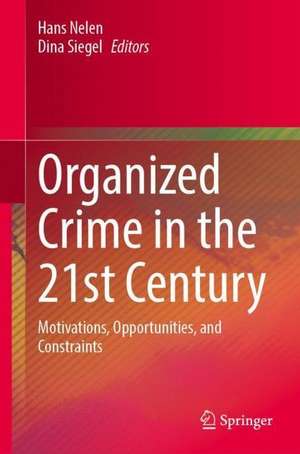Organized Crime in the 21st Century: Motivations, Opportunities, and Constraints
Editat de Hans Nelen, Dina Siegelen Limba Engleză Hardback – 11 mar 2023
Preț: 399.16 lei
Nou
Puncte Express: 599
Preț estimativ în valută:
76.38€ • 79.96$ • 63.20£
76.38€ • 79.96$ • 63.20£
Carte disponibilă
Livrare economică 15-29 martie
Livrare express 01-07 martie pentru 38.56 lei
Preluare comenzi: 021 569.72.76
Specificații
ISBN-13: 9783031215759
ISBN-10: 3031215753
Pagini: 238
Ilustrații: XI, 238 p. 4 illus., 2 illus. in color.
Dimensiuni: 155 x 235 x 23 mm
Greutate: 0.53 kg
Ediția:2023
Editura: Springer International Publishing
Colecția Springer
Locul publicării:Cham, Switzerland
ISBN-10: 3031215753
Pagini: 238
Ilustrații: XI, 238 p. 4 illus., 2 illus. in color.
Dimensiuni: 155 x 235 x 23 mm
Greutate: 0.53 kg
Ediția:2023
Editura: Springer International Publishing
Colecția Springer
Locul publicării:Cham, Switzerland
Cuprins
Chapter 1. Setting the scene.- Part. 1 Markets and networks.- Chapter 2. The Development and Surges of Organized Crime: An Application of Enterprise Theory.- Chapter 3. The organisation of crime in the transnational adoption market.- Chapter 4. Drug crime and the port of Rotterdam: About the phenomenon and its approach.- Chapter 5. Drug-related organized crime in the Meuse Rhine EU-region and the role of national borders.- Chapter 6. ‘Clan Crime’ in Germany: Migration Politics, Socio-economic Conditions and Intergenerational Transmissions of Criminal Behavior.- Chapter 7. Arab Organized Crime in Israel.- Chapter 8. The h200d office: the local embeddedness of the Dutch Crips gang.- Chapter 9. Contract Killings by Organised Crime Groups: The Spread of Deadly Violence.- Part 2. Responses.- Chapter 10. The criminalization of the trade in wildlife.- Chapter 11. Policing the Environment: The Prosecution of Wildlife and Environmental Crimes.- Chapter 12. Why The Hague Convention Isn’t Enough: addressing enabling environments for criminality in intercountry adoption.- Chapter 13. Tackling criminal family networks in the Netherlands: observations & approaches.- Chapter 14. Are Dark Number Estimates of Crime Feasible and Useful?.
Notă biografică
Hans Nelen is Professor of Criminology at the Department of Criminal Law and Criminology at the Faculty of Law of Maastricht University, the Netherlands. He has an academic background in both criminology and law. Between 1986 and the beginning of 2001, Nelen was employed as a senior researcher and research supervisor at the Research and Documentation Centre of the Ministry of Justice in the Netherlands (WODC), mainly involved in drug, fraud, organized crime, corporate crime and police research. Between 2001 and 2006 he was a senior lecturer/associate professor and senior researcher at the Institute of Criminology of the VU University Amsterdam. Since January 1 2007 Nelen has been working as a professor of criminology at Maastricht University (UM). He is Director of the Maastricht Institute for Criminal Sciences (MICS) and Chair of the Centre for Information and Research on Organized Crime (CIROC). Nelen published a large number of books and articles on a variety of criminological subjects, i.e. corruption and fraud, organized crime, money laundering, legal professionals, the administrative approach to organized crime, cross-border police cooperation and football and crime.
Dina Siegel is Professor of Criminology at the Willem Pompe Institute for Criminal Law and Criminology of Utrecht University, the Netherlands. She studied sociology and social anthropology at the Tel-Aviv University, Israel, and obtained her PhD in cultural anthropology at the VU University of Amsterdam, the Netherlands. Siegel worked between 2001-2008 as an assistant professor at the Institute of Criminology of the VU University Amsterdam. From 2009 onwards she has been working as a Professor of Criminology at Utrecht University. She is director of the master programme in Criminology, was the president of International Association for Studies on Organized Crime (IASOC) and is a board member of the Centre for Information and Research on Organized Crime (CIROC).
Dina Siegel is Professor of Criminology at the Willem Pompe Institute for Criminal Law and Criminology of Utrecht University, the Netherlands. She studied sociology and social anthropology at the Tel-Aviv University, Israel, and obtained her PhD in cultural anthropology at the VU University of Amsterdam, the Netherlands. Siegel worked between 2001-2008 as an assistant professor at the Institute of Criminology of the VU University Amsterdam. From 2009 onwards she has been working as a Professor of Criminology at Utrecht University. She is director of the master programme in Criminology, was the president of International Association for Studies on Organized Crime (IASOC) and is a board member of the Centre for Information and Research on Organized Crime (CIROC).
Textul de pe ultima copertă
This edited volume brings together the most recent research about various aspects of organized crime and the responses that have developed worldwide as a result to contain serious criminal acts. This book focuses particularly on the way criminal networking and illegal markets have developed during the first two decades of the 21st century. It examines how these developments have influenced the motivations and opportunities to commit organized crime. The volume not only focuses on illegal activities in illegal markets, such as drug and human trafficking, but also addresses organized crime and deviance in various legitimate industries. The contributions were presented at seminars of the Centre for Information and Research on Organized Crime (CIROC), and will be of particular interest to organized crime scholars and researchers, as well as advanced students of criminology across the world.
Caracteristici
Provides the most recent information about various organized crimes Unique focus on impact of networking and illegal markets Global perspective allows for more transnational investigations
